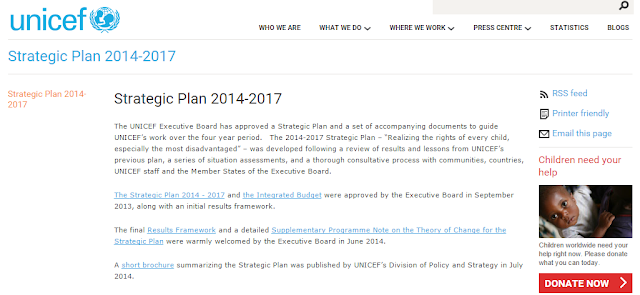The UNICEF Executive Board has approved a Strategic Plan and a set of accompanying documents to guide UNICEF’s work over the four year period. The 2014-2017 Strategic Plan – “Realizing the rights of every child, especially the most disadvantaged” – was developed following a review of results and lessons from UNICEF’s previous plan, a series of situation assessments, and a thorough consultative process with communities, countries, UNICEF staff and the Member States of the Executive Board.
The Strategic Plan 2014 - 2017 and the Integrated Budget were approved by the Executive Board in September 2013, along with an initial results framework.
The final Results Framework and a detailed Supplementary Programme Note on the Theory of Change for the Strategic Plan were warmly welcomed by the Executive Board in June 2014.
A short brochure summarizing the Strategic Plan was published by UNICEF’s Division of Policy and Strategy in July 2014.
Development process
The twice extended UNICEF medium-term strategic plan (2006-2013) will conclude this year. The next plan for the period 2014-2017 synchronised with UNDP, UNFPA and UN-Women strategic planning cycles will be discussed in draft form during the annual session of the UNICEF Executive Board and adopted at the Second Regular Session in September, 2013. The preparation of the plan is informed by the End-of-Cycle review of the current plan that was presented at the February session of the Executive Board.
The end-of-cycle (EoC) review of the MTSP 2006-2013 (summarized in E/ICEF/2013/4) provided an opportunity to analyse the progress made towards the child-related Millennium Development Goals; assess the effectiveness of each programme strategy to achieve results; and review the changing context as a key input to the planning of the next MTSP. The next MTSP will include limited but strategic shifts in the substantive emphasis of the plan as well as more significant modifications in the mix of programme strategies to support countries to achieve results while retaining enough flexibility to enable UNICEF to develop country programmes of cooperation that respond to the specific needs of each country context.
The EoC review of the plan was informed by several analytic and strategic reviews including the following:
1. In-depth thematic reviews on each of the focus areas and humanitarian action:
Young child survival and development
Basic Education and Gender Equality
HIV AIDS and Children
Child Protection from violence, exploitation and abuse
Policy advocacy and Partnerships for Children's rights
Humanitarian action
2. Survey of UNICEF country offices and
3. Survey of Member states and UNICEF National committees
MTSP and Executive Board
The UNICEF Executive Board in its decision 2011/12 requested UNICEF to present, at the first regular session of 2012, for approval by the Executive Board, a "roadmap" towards the medium-term strategic plan for 2014-2017, including the results-based management framework and indications of how this work relates to the integrated budget of UNICEF.
UNICEF has established a peer review group of experts on Results Based Management drawn from Member states and UN agencies to a) identify ways to strengthen linkages of the strategic plan results frameworks with country programmes of cooperation and global and regional priorities; b) establishing targets and benchmarks; c) exchange ideas and experiences on good practices; and d) agree on principles of applying RBM in the next plan.
The peer review group met in May, 2012 and followed up its consultations virtually through half day consultations in November, 2012 and in February, 2013.
Consultation with Member states, UN agencies and INGOs
UNICEF will organize a consultation workshop on 22nd March 2013 for member states, UN agencies and INGOs to review various elements of the strategic plan that is under preparation.
The concept note, agenda and presentation are available and various background papers will also be shared to the participants of the meeting.
UNICEF presented the outline of the new MTSP at the first regular session of the Executive Board in 2013. UNICEF in the new MTSP for 2014-2017 is proposing seven high level results.
Early versions of the draft result frameworks as work in progress are available below:
- Health
- HIV and AIDS
- Water, Sanitation and Hygiene
- Nutrition
- Education
- Child Protection
- Social Inclusion
Programme Strategies
The workshop discussed the strategic orientation of the MTSP; the proposed integration of the normative principles of human rights, gender and environmental sustainability and the approach to programme strategies including benchmarks for measuring and reporting. It was also an opportunity to review the link with the Results and Resources Framework in the Integrated Budget.
The session-wise presentations at the workshop are available here:
- Context and Background for the MTSP
- Programme components of the plan
- Gender in the next plan
- Humanitarian action in the plan
- Integrated results and resources framework
- Funding the next plan
- The draft summary of this workshop is available here.
Informal consultations with Member States have also led UNICEF to develop an internal working paper that elaborates the Theory of Change underpinning the draft Strategic Plan. This document was made available as a first draft in June 2013. The current version has been prepared based on comments and feedback provided internally and by member states. In addition, UNICEF has prepared a document summarizing the alignment of the draft Strategic Plan with the QCPR, as attached.


No comments:
Post a Comment